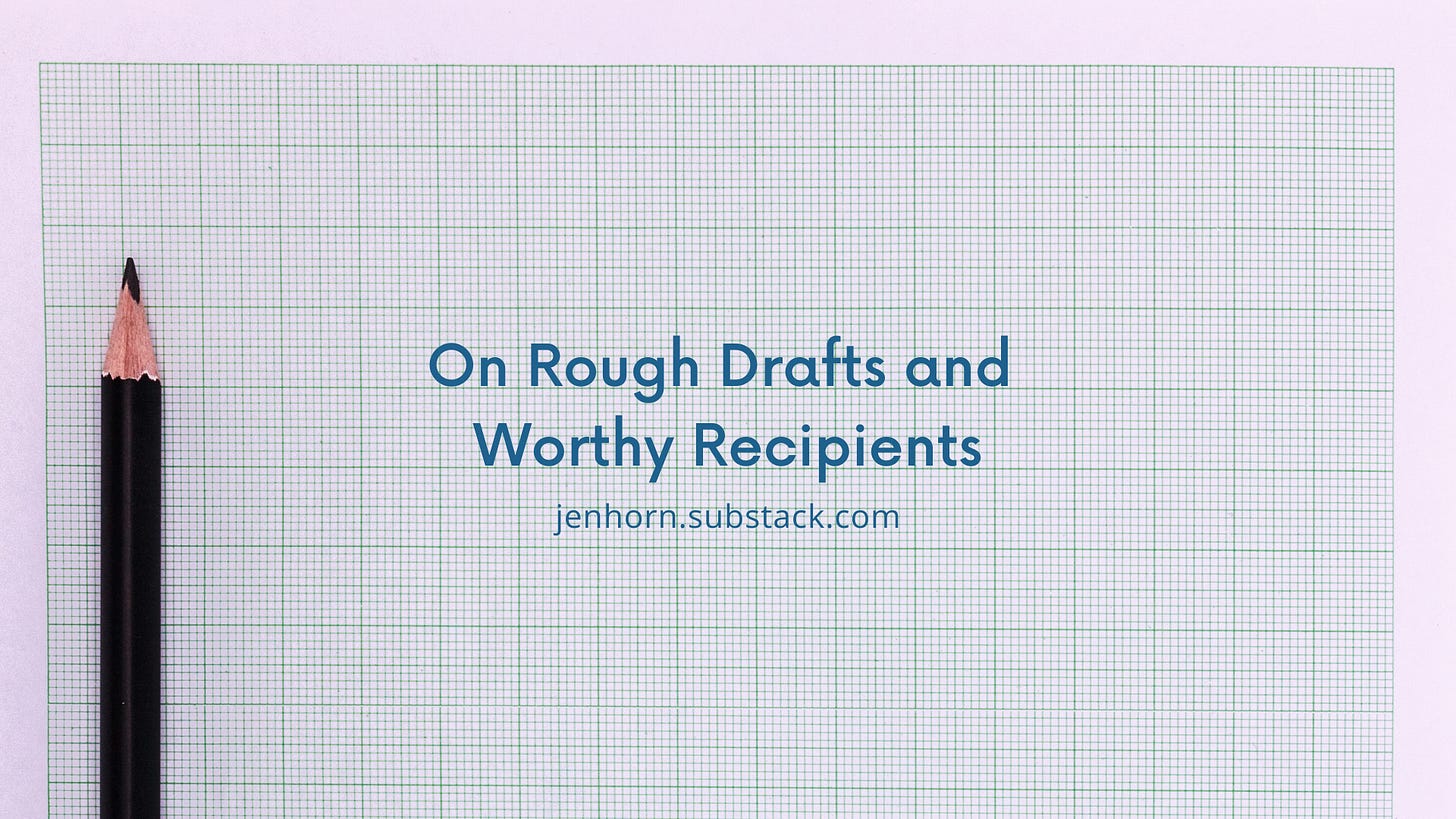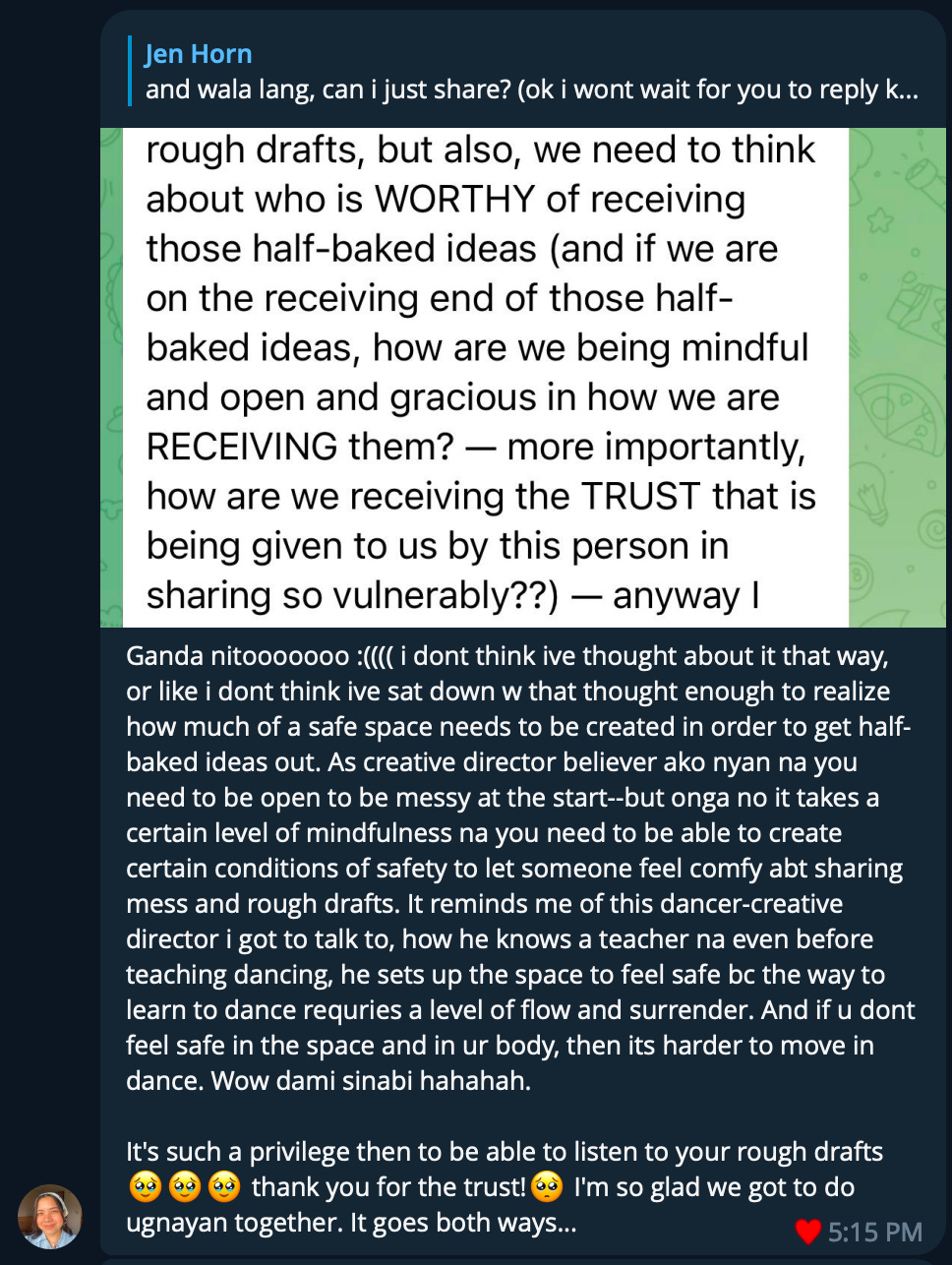On Rough Drafts and Worthy Recipients
We can (often) feel self-conscious about sharing half-baked ideas. Who are the worthy recipients of these in our lives? And how might we be worthy recipients of the rough drafts of others?
Sometimes we need to be reminded.
After on and off attempts at restarting my journaling practice, I took a prompt from a list of reflection and conversation prompts that I had been working on for our upcoming @ugnayancards. I reflected on the question below:
How whole do you feel a project or idea of yours needs to be before you can share it with others?
Gaano ka-buo dapat ang isang proyekto o ideya mo bago mo ito maibahagi sa iba?
I found myself mulling over this idea of “rough drafts”. One thing that stalls work, or keeps people (myself included) from asking for help or feedback sooner than later, is the hesitation in showing our rough drafts.
We want to be able to put our best foot forward, our best work out there, to seem competent and capable and worthy of taking up time and space, of being given a certain title or designation.
This desire and desired projection can sometimes (often) get in the way of our very best work.
Pagpapalakas at pagpapatibay ng loob
I know I’ve delayed certain project timelines in times when I was struggling, swimming in my own thoughts and ideas about a particular project. I could have shared my rough ideas with others for some perspective, feedback, clarity and direction sooner than later, but hesitated.
This has happened for me, whether it was in writing my dissertation, earlier podcast scripts, or even posts on this blog. I don’t think my thoughts or ideas are ever 100% fully expressed when I hit print, send or publish.
"It's possible that one of the reasons you got on the path of mastery was to look good. But to learn something new of any significance, you have to be willing to look foolish...
When a Most Valuable Player candidate misjudges a ball and falls on his duff, he does it in the sight of millions. You should be willing to do it before your teacher and a few friends or fellow students. If you're always thinking about appearances, you can never attain the state of concentration that's necessary for effective learning and top performance."
- George Leonard1
Perhaps because the nature of thought is ever-evolving, it may even be more worrisome if we think that our thoughts are ever fully formed at any given point. There will always be room to learn more and add more. But something can be “finished” and “incomplete” at the same time. And sharing it with others can help us gain perspective or clarify our own thoughts.
I write this to remind myself: It’s okay that it isn’t perfect yet. It’s not a measure of my competence if entire sections get crossed out, if ideas get scrapped. It’s a measure of my attempt and my effort. And in the case of “low stakes” projects, just have fun with it. And even in “high stakes” projects, it’s important to just have fun with it too. ;)
I remember tearing up in front of my dissertation supervisor when I was stressing about whether my dissertation proposal was “meaningful enough”. He made me realize it just needed to be meaningful enough to me.
I also remember tearing up in front of Jackie and TJ, two of the partners at Haraya Coaching, in the early stages of us birthing a podcast for which I would be the main producer. They reassured me that this was a risk they were willing to take, they trusted me to do my best, and wanted us to have fun with this. (Click through the IG video below for a laugh!) :D
Ligtas na Paglalahad
More recently, I’ve also had conversations on failure and rough drafts with friends turned creative co-conspirators.
Kookie is my co-creator for Ugnayan Cards. She is a creative director, typographer, illustrator, and one of my play inspirations. And in a conversation I had with her yesterday, I was reflecting (word vomitting) to her some of my reflections on the question I pose in this article. Here’s some of that word vomit:
So it’s not just about having the vulnerability to share, and the openness to the outcome of sharing, but also really about knowing who is worthy of receiving that. And also being that person who is worthy of being given that trust to.
Some people are just not the right recipients of our half-baked ideas. Even well-intentioned friends and family. Some may listen to us and share their concerns or worries about failure. They only want us to succeed. Some may listen to us and blindly cheer us on in our goals and dreams. They only want us to be happy.
So who are the people who we can give our trust to, who will receive our ideas openly and help us build on them? And in leading or collaborating with others, how might we receive ideas (trust) with care and grace that helps the giver in the way they need?
Carl is one of my co-creators and host of The Imaginable Workplace podcast. He is also CEO of PumaPodcast, a creative writing professor, and former high school to a laughable number of friends of mine.
In our conversations between podcast episode recordings, culture-building workshops and coaching sessions that Haraya Coaching does with them, we’ve spoken about the willingness to share first / second / third drafts, and putting the bad ideas out there so the better ones can come through.
From our podcast episode on Imagine a Safe Space To Grow (on psychological safety), here’s a practice Carl shared on intellectual humility and creating a safe space for rough drafts:
“I have the privilege of working with super smart people, and the best thing you can do as a manager is to set things up and get out of the way so they can do their smart things. […] One of the things I like to do --- is to say, “let me ask the stupid question,” or “let me find the dumbest possible example to this thing,” then let’s start from there because it can only get smarter. But if I’m willing to go that far out, I’m not worried about saving face. […] Let’s do something weird. I really want to reward weird things.”2
What thinking can help you embrace thinking of the inevitable messiness and weirdness in engaging fully with an uncertain, creative life?
Pagtatapos…?
As I conclude this post, I am grateful I have people like Kookie and Carl (and other colleagues and collaborators I will not name one by one) who I can share rough drafts to. Thank you.
I know I have more thoughts — more I could write, more I could research, and also more that I could edit down (!), but I will celebrate the raw nature of this rough draft.3 This Substack has been home to my half-baked thoughts and poorly drawn lines, helping me make way for “better”, as I’m constantly trying to define and redefine it.
In the meantime, in the spirit of rough drafts, I wanted to briefly share some of the things I’ve been working on lately:
Ugnayan: Cards for Connection - This deck (coming later this month!), co-created with Kookie, is intended as a reflection and conversation companion in creating a deeper, more meaningful and liberating connection with one’s self, others and the world. Will share more details about it in another post in the coming weeks!
The Imaginable Workplace Season 2 - We’re nearly finished with the production of 3 out of 8 of episodes of the new season, and you can listen to the first two that are out here. We’ll be taking a break after releasing the 4th episode, and would love to get your feedback on the first four episodes while we’re on break!
Pahuway: A curated group trip to Negros Oriental with me - While still a rough idea, I recently posted on my personal IG Close Friends stories about a trip I’d like to organize to Negros Oriental next year. Putting the idea out there has given me the opportunity to gather data on what kind of travelers are interesting in traveling with me, and what they look for. If you’re interested, hit me up in my DMs.
Likha Ginhawa: A creative wellbeing journey - (Still undecided on the name) I’ve been working on developing a learning and coaching program to support women in practicing creative wellbeing — finding wellbeing through a creative practice / cultivating a creative practice through a focus on wellbeing. Again, if you’re interested, hit me up in my DMs.
Culture First Manila gatherings - I’m still conceptualizing the upcoming events…thinking now to theme them according to the kinds of cultures different organizations may want to try cultivating, beginning with a “culture of connection” and a “culture of purpose”. Sign up to join the Manila chapter to get notified about our upcoming (free) events!
Learned about him through James Clear’s newsletter, and would like to learn more about his work as an author, educator and Aikido practitioner in his 1992 book Mastery: The Keys to Success and Long-Term Fulfillment.
The Imaginable Workplace (2022) Imagine A Safe Space To Grow. Season 1, Episode 3. Listen to Carl talk to Dr. Joy Teng-Calleja of Ateneo CORD about psychological safety and a joke factory! It was one of my memorable moments in producing this show. XD
Decided to embrace rough drafts more. So much so that I claimed it in my edited @pagbubuo Instagram bio.










